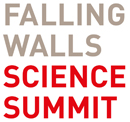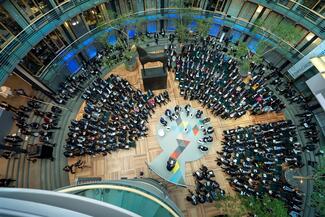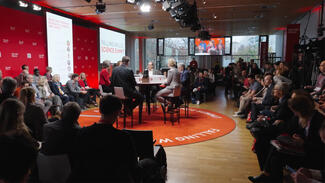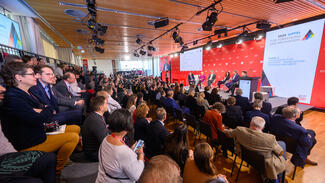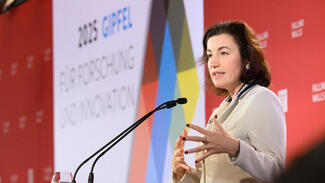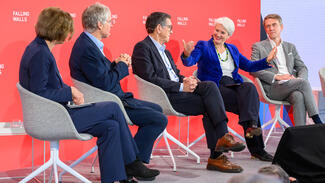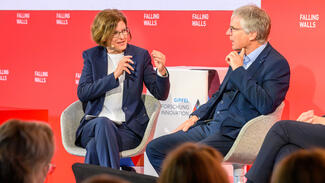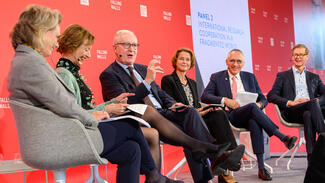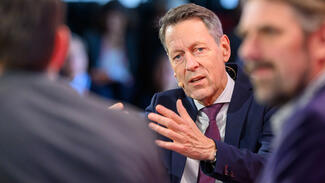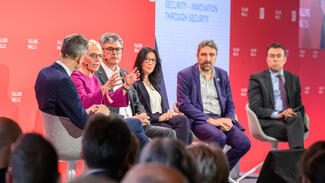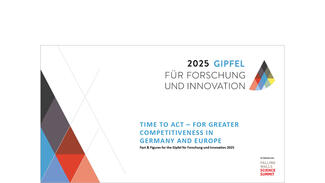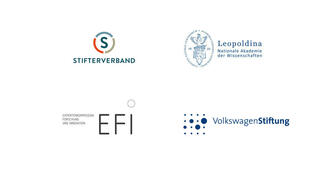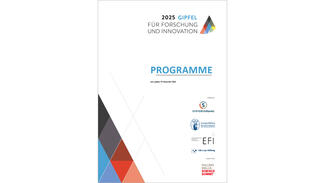
Time to act –
For greater competitiveness
in Germany and Europe
Half a year after the start of the new German government, the Summit for Research and Innovation 2025 ("Gipfel für Forschung und Innovation 2025") offered a forum for politics, science, and business to bring current developments in research and innovation policy to the forefront of public debate. The challenges regarding Germany and Europe as research and innovation locations are not new. However, the pressure for change intensifies in a time of global upheavals, geopolitical tensions, and rapid technological developments.
Global competitors like China and the USA are investing more and with greater dynamism than Germany and Europe in research and innovation, especially in key technologies such as Artificial Intelligence and quantum technologies. Europe is becoming increasingly dependent when it comes to many critical technologies and raw materials for digital products. Tariffs and unreliable supply chains increase uncertainty for companies in Germany, Europe, and worldwide. The international exchange of knowledge is also coming under pressure: the freedom of science is being restricted in many countries, and barriers are being placed on international scientific cooperation. Cross-national research is being re-evaluated under security aspects and must prove itself anew in situations of geopolitical tension.
In this global situation, Germany and Europe must proactively set the course for sustainable and future-proof competitiveness. Under the guiding theme “Time to act – for more competitiveness in Germany and Europe,” the Summit raised critical questions and illuminated concrete solutions to the most pressing issues of our time: the capacity for transformation, cooperation, and security.
Programme line-up
9:00
Opening by Dr. Volker Meyer-Guckel (General Secretary of the Stifterverband) and Prof. Dr. Jürgen Mlynek (Chairman of the Falling Walls Foundation)
Event moderated by Andrea Frank, Deputy Secretary General of the Stifterverband
9:10
Keynote
Dorothee Bär, Germany's Federal Minister of Research, Technology and Space
9:45
Panel 1: Structural Changes in the Research and Innovation System
moderated by Prof. Dr. Irene Bertschek, Chairwoman of the Expert Commission for Research and Innovation (EFI)
- What framework conditions are needed for industry to invest more – and more strategically – in research and innovation?
- What changes are necessary within the scientific system to strengthen innovation capacity and knowledge transfer?
- How can policymakers support the structural changes needed in the research and innovation system?
- Do we need new forms of collaboration between science, business, and politics?
Panelists:
Prof. Dr Holger Hanselka, President of the Fraunhofer-Gesellschaft, Munich
Prof. Reinhold Geilsdörfer, Chairman of the Board of Directors, Dieter Schwarz Foundation, Neckarsulm
Dr. Sabine Klauke, Member of the Executive Committee, Head of Digital Design Manufacturing and Services, Airbus, France
Prof. Dr. Wolfgang Wick, Chairman of the German Science and Humanities Council, Berlin
Thomas Jarzombek, Parliamentary State Secretary at the Federal Ministry of Digital Transformation and Government Modernisation, Berlin
10:45
Panel 2: International Research Cooperation in a Fragmented World
moderated by Prof. Dr. Bettina Rockenbach, President of the National Academy of Sciences Leopoldina
- How can international scientific cooperation be sustained in an increasingly fragmented world order?
- What consequences does this have for research security, data flows, and knowledge exchange?
- How should Germany and Europe seize opportunities to attract top researchers and strengthen their position as a hub for open and free science?
- How does industrial research position itself within the new geopolitical context?
Panelists:
Prof. Dr. Astrid Lambrecht, Chairwoman of the Board, Forschungszentrum Jülich
Prof. Dr. Stefan Asenkerschbaumer, Chairman of the Supervisory Board, Robert Bosch GmbH, Gerlingen
Prof. Dr. Hugh Brady, President of Imperial College London, London
Prof. Dr. Thierry Coulhon, President of the Management Board, Institut Polytechnique de Paris (IP Paris), Paris
Prof. Dr. Maria Leptin, President of the European Research Council (ERC), Brussels
11:45
Lunch Break
12:45
Panel 3: Innovation for Security – Innovation through Security
moderated by Dr. Georg Schütte, CEO of the Volkswagen Foundation
- How is Europe positioned with regard to security-relevant research?
- How much cooperation between business and science takes place in security-relevant research?
- What hinders cooperation (from cultural factors and mindsets to infrastructure and regulation)?
- What new structures and responsibilities are needed for this?
Panelists:
Prof. Dr. Tanja Brühl, President of the Technical University of Darmstadt
Dr. Thomas Mason, Director of Los Alamos National Laboratory, USA
Prof. Dr. Christian Hummert, Research director at Cyberagentur, Halle (Saale)
Dr. Nils Schmid, Parliamentary State Secretary, at the Federal Ministry of Defence, Berlin
Dr. Chiara Pedersoli, CEO of OHB System AG, Bremen
13:45
Concluding Remarks by the Partners of the Summit for Research and Innovation
14:00
End of the event

The Organizers of the
Summit for Research and Innovation
as part of the
